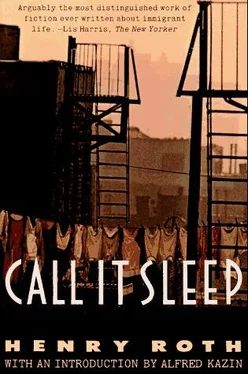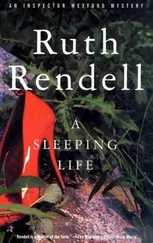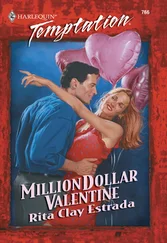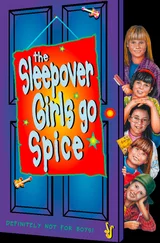“Mama!” he tried to keep his voice down to a whisper, but failed.
“Oh!” she started. “You frightened me!” and then stretched out her arms.
“I didn’t know you were here.” He entered the delicious circle of her embrace.
“My head is like an old bell,” she sighed pressing him to her. “Idle and without hearing, but murmuring sometimes, a little insecure.” Then she laughed and kissed his brow. “Did you get your shoes wet in the rain?”
“No I ran into the cheder just before.”
“That sweater is too thin.”
He had been holding the Indian penny in one hand to keep it from jingling against the other. And now he held it up. “Look what I’ve got.”
“My!” she marveled. “How did you come by that?”
“The rabbi gave it to me.”
“The rabbi?”
“Yes. I was the only one who knew the chad godyuh from last time.”
She laughed and hugged him. “Solomon, Sage!”
He took a deep breath. He had asked her before, but somehow the thought was too elusive. He needed to be told again.
“Who is God, mama?”
“You keep asking exactly the right person,” she smiled. “Doesn’t the rabbi ever tell you?”
“You can’t ask him anything.”
“Well, why are you so interested?”
“I don’t know. I mean you didn’t tell me what he looked like.”
“That was because I didn’t know.” She chuckled at his chagrin. “Still I’ll tell you what—”
But breaking her speech, his father’s painful, awakening groan reached them from the bedroom.
“Genya!”
“I’m in here, Albert.”
“Hmm!” Always he seemed to need reassurance, always he seemed reassured. And was silent. David hoped she would hurry on before he came in.
“Yes,” she continued. “I’ll tell you what a pious old woman in Veljish told me when I was a little girl. And that’s all I know. She said that He was brighter than the day is brighter than the night. You understand? But she always used to add if darkest midnight were bright enough to see whether a black hair were straight or curly. Brighter than day.”
Brighter than day. That much seemed definite, seemed to conform with his own belief, that much he could grasp. It reminded him of the steps of the chad godyuh. “And He lives in the sky?”
“And in the earth and in the water and in the world.”
“But what does He do?”
“He holds us in His hand, they say — us and the world.”
His father had come in, hacking, clearing his sleep-clogged breath. He stood darkly in the doorway. There was room for one more question and that was all.
“Could He break it? Us? The streets? Everything?”
“Of course. He has all power. He can break and rebuild, but He holds.”
His father made an impatient sound with his lips. “Why do you sit in darkness?”
“My washing,” she laughed apologetically. “The little curtains for the Passover. It grew dark as I was about to hang them up. And I thought, well, Friday, best the neighbors didn’t see me or they’ll cluck. Do you know your son won a penny in the cheder?”
“What for? Because he asks such bright questions? Makes and breaks. A fool in a sand heap.” He yawned. His stretching arms pressed against both sides of the door-frame till it creaked. “We need some light.”
VII
IT WAS Monday morning, the morning of the first Passover night. One was lucky in being a Jew to-day. There was no school. David had just come down the stairs carrying the wooden spoon into which the night before his father had swept up the last crumbs of leavened bread, swept them up with a feather and bound them with a rag — chumitz — leavened bread to be burned in the fire. And now on the top step of the stoop, he paused awhile and watched the Hungarian janitor polish one of the brass bannisters in front of the house. It had a corrupt odor, brass, as of something rotting away, and yet where the sun struck the burnished metal, it splintered into brilliant yellow light. Decay. Radiance. Funny.
“You no touch!” warned the janitor, scowling while he rubbed the bannister. “No stayin’ here.” Then his eyes lighted on the spoon and feathers in David’s hand. “Matziss, huh?” A grin dove up through the depths of the frown, hovered and plunged down again. “Dun boin frun’ dis house.”
David went down the stairs and walked toward the middle of the block. Someone had kindled a small fire there. Once the spoon had been dropped into the flames, his duty was done and he could do what he pleased until cheder time — it would be a little earlier to-day. And then with two cents at call upstairs — he had reserved the spending of them until after lunch when he would probably get another penny from his mother — he looked forward to an exciting afternoon.
Three boys, all bigger than himself guarded the flame, and when he drew near, “Waddaye wan’?” one of them demanded.
“I wanna t’row my chumitz on hea.”
“We’ea’s yuh penny?”
“Wa penny?”
“Us boin chumitz for a penny. De t’ree of us is potnes, ain’ we Chink?”
“Yeah, dis is our fiuh.”
“Aintchuh gonna led me boin mine? I only god one liddle one.”
“No!”
“Make yuh own fiuh.”
“Gwan if yuh ain’ god a penny, we don’t wan yuh lousy chumitz—”
A sudden scraping sound followed by a snarl of foreign words, made them all spin about.
“Mannagia chi ti battiavo!”
The broad, glitter-edged, half laden shovel of a white-garbed street-cleaner plowed toward them.
In their turn, the lords of the flame became suddenly suppliants. “Hey mister! Don’ push id! Id’s a sin. Look out! Dot’s chumitz! An id’s on duh sewer too. Wadduh yuh wan’?” They danced about him. “Id’s on duh sewer! Id don’ make de street soft we’en we boin on de sewer.”
“Ah kicka duh assuh! Geedah duh!” The implacable shovel bit through the coals scattering them before it.
“Yuh lousy bestitt!” shrieked the guardians. “Leave our chumitz alone! We c’n boin id hea — de cop lets us!”
“Waid’ll I call my fodder!” threatened the one who had first kept David at bay. “He’ll make yuh stop! Hey Pop! Pop! Tateh! Comm oud!”
A man with a short beard and a blood-smeared apron looked out of the butcher-shop.
“Pop! Look. He’s pushin’ our chumitz wid all duh shit!”
With an outraged cry, the butcher came running out, followed a few seconds later by his wife, aproned like himself.
“Fav’y you push dis, ha?” The butcher flung an angry hand at the choked, smouldering embers mixed now with rubbish and manure.
“Wadda you wa-an?” The street cleaner stopped angrily, black brows leaping together as stiff as carbon rods under the white helmet. “You no tella me waddaduh push! I cleanuh dis street. Dey no makuh duh fiuh hea!” His intricate gestures jig-sawed space.
“No? I ken’t tell you, ha? Verstinkeneh Goy!” The butcher planted himself directly before the mound upon the shovel. “Now moof!”
“Sonnomo bitzah you! I fix!” He leaned viciously on the shovel-handle. The smouldering hummock sprang forward. The butcher leaped heavily sideways to avoid being mowed down into the variegated debris.
“You vanna push me?” he roared. “I’ll zebreak you het.”
“Vai a fanculo te!” The sweeper threw down the shovel. “Come on! Jew bast!”
But before either could strike a blow, the butcher’s wife had seized her husband’s arm.
“You ox!” she shrilled in Yiddish. “Do you oppose an Italian? Don’t you know they carry knives — all of them! Quick!” She dragged him back. “Inside!”
“I don’t care,” stormed her husband, though he made no effort to break her hold. “And I? Have I no knives?”
Читать дальше












